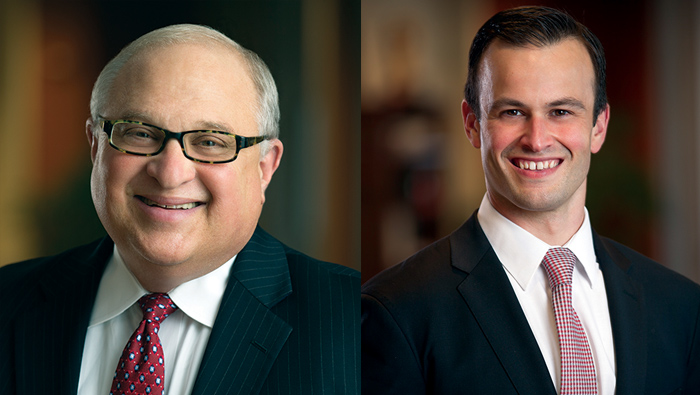
By Steve Kantor and Walker Clark
Estate planning can mean a variety of things, depending on individual goals and values. A chief element of any estate plan includes creating a will or trust to ensure the well-being of loved ones after death. In a business context, estate planning encompasses both ensuring the financial security of loved ones and creating an appropriate succession plan. Many also desire to provide a lasting legacy for the community at large. With the High Holidays rapidly approaching, it’s a good time to think about passing on one’s legacy to future generations and the Jewish community.
The current annual exclusion from gift tax is $14,000, meaning an individual may gift up to $14,000 per donee, per year. Noncharitable and nonmarital gifts totaling more than $14,000 to one person in a year will reduce the donor’s $5.45-million federal estate and gift exemption. At an individual’s death, the unused remainder of his or her $5.45-million exemption is applied to determine whether and to what extent federal estate tax will be due. Charitable and marital gifts can reduce that tax. Oregon has no gift tax, but the exemption from Oregon’s estate tax is only $1 million. Whereas federal estate tax is 40% on amounts in excess of the exemption, Oregon’s estate tax rate ranges from 10% to 16%.
In the case of family-owned businesses, estate and succession planning often go hand in hand. Take, for example, a couple owning several rental properties. If they desire to pass on the business to their children, they can create a family LLC to hold the properties and then gradually transfer ownership interests in the LLC to their children through the use of the annual exclusion from gift tax. Parents can potentially take advantage of valuation discounts and transfer even more value out of their taxable estates. Parents can also provide guidelines regarding how the remaining interest they own in the LLC will be handled following their deaths. Furthermore, if their children are still minors, parents can use an asset-protection tool such as a trust to protect gifted assets until the children are grown and ready to manage their own assets. There are also trusts that allow parents to gift assets to their minor children, but provide for control and protection over the assets until a later date.
When making these transfers, it is important to consider both estate and income tax consequences in advance. A downside to these transfers is that any assets transferred to the children while the parents are living will not receive a step-up in basis (increase to fair market value) at either parent’s death. The children will instead take the parent’s adjusted cost basis in the gifted asset. If the children subsequently sell the gifted asset, they will have to recognize gain to the extent the sale price exceeds basis. Assets transferred at death, however, receive a step-up in basis to the fair market value on the date of death. The children could immediately sell any inherited asset with little or no income recognition. Whether an asset should be gifted to the next generation during life or at death depends on several factors, which must be evaluated on a case-by-case basis.
Charitable giving is another effective tool for tax reduction, allowing a donor to leave a legacy that will last far beyond death. While tax rates and exemption amounts often change on congressional whims, the deduction for charitable gifts has remained constant, and the types of qualifying gifts during life continue to grow. For example, the deduction for qualified charitable distributions from IRAs was recently made permanent. Individuals 70½ or older may now make direct distributions (not to exceed $100,000) from their IRAs to charitable organizations and pay no income tax on the distribution.
Charitable gifts made at death are deductible from both the federal and Oregon estate tax, and making a charitable gift does not necessarily mean that you have to relinquish all control over the gifted asset. Individuals can make gifts in their wills or trusts to organizations such as the Oregon Jewish Community Foundation and specify that the gift be held as a fund or endowment for a specific cause, organization or field of interest. In our experience, the OJCF has been very accommodating in working with the personal representative or trustee to meet the decedent’s goals. For example, through working with the OJCF, we were recently able to combine two smaller bequests for different causes from an individual into a single endowment to ensure those bequests would continue to provide funds for both causes for years to come.
Many public charities, including the OJCF, also allow individual donors and families to establish donor-advised funds. A DAF allows a donor to receive an immediate tax benefit for charitable contributions, while retaining an advisory role to recommend to what charities the income from those assets should be distributed. Contributions to a DAF are deductible in the year in which they are made, but the fund advisor (usually the initial donor and/or his or her descendants) retains the power to recommend grants from the fund during its existence.
Whether you are planning to ensure your family’s well-being or the continuation of your business, provide for the community at large, or some combination thereof, the importance of having a plan in place cannot be understated. Creating an estate plan provides peace of mind that you are doing what you can to ensure that the people and causes you care about flourish long after you are gone.
A partner at the Samuels Yoelin Kantor LLP law firm in Portland, Stephen Kantor and his wife Elaine were named 2016 Oregon Jewish Community Foundation Legacy Society Honorees. He also is a member of the B’nai B’rith Camp board, and a past president of Jewish Family & Child Service.
Walker Clark joined Samuels Yoelin Kantor in 2015, where he is an estate planner and taxation lawyer. He advises families and small businesses in Oregon and Washington. Walker has been attending Congregation Neveh Shalom his entire life, and he is a member of the OJCF Giving Council.





